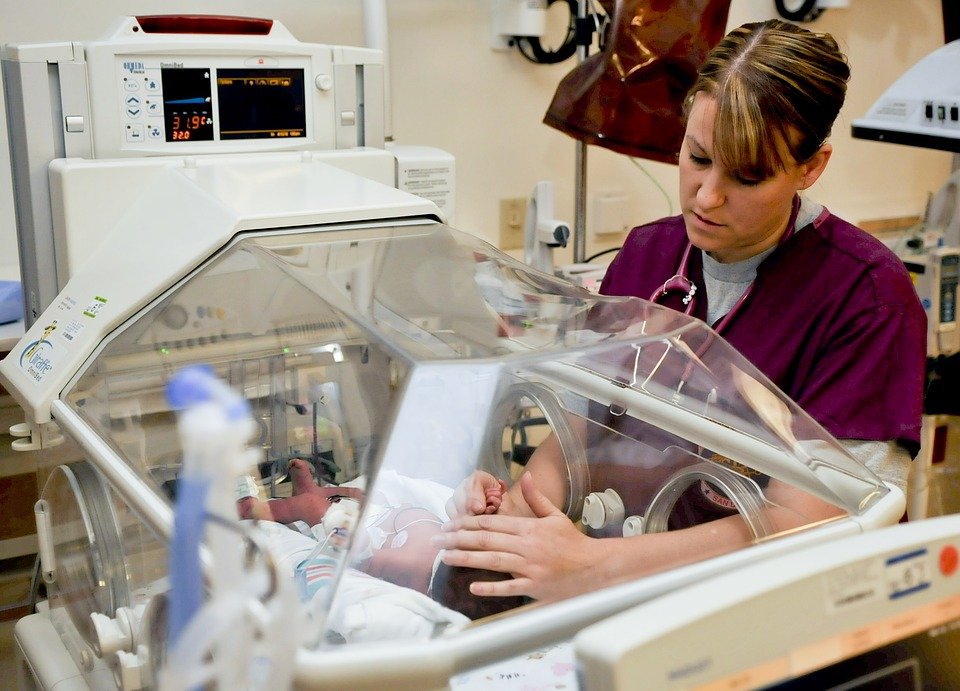Highest Paying BSN Jobs: How Can a Bachelor’s Degree in Nursing Impact Your Earnings

Nursing is undeniably a tremendously fulfilling career. You play a direct role in helping people and saving lives – it doesn’t get more meaningful than that. It is also a field brimming with options and possibilities – from informatics to working with children, you can choose the career track that best suits your interests and passions.
A great way to ensure you take advantage of all the benefits of a nursing career is to advance your studies and get a Bachelor’s Degree in Nursing. That will give you access to a broader pool of career opportunities. Just as importantly, earning your BSN is also the path to higher pay. Of course, salary mainly depends on your education level, years of experience, the area where you live, and other factors. But if thoughts like “How much do BSN nurses make?” and “Will getting a Bachelor’s degree impact my earnings?” have crossed your mind, it’s worth exploring the financial gains that come hand in hand with that RN BSN title.
Read on to discover how much money you can make as a BSN nurse. We have compiled data to answer any questions you might have – from starting salaries for BSN nurses to the average salaries in every state. But why stop there? Find out what the highest-paying nursing jobs are for RNs with bachelor’s degrees and what other benefits you can enjoy as a BSN nurse.
What Is the Starting Salary of a BSN Nurse?
When deciding whether or not to pursue a BSN education, the decisive factor may be your earning potential – and we’re not talking about how much you can earn after ten or twenty years of experience (although that’s just as important). From a pragmatic perspective, you undoubtedly want to know what paycheck you can expect to cash in, even in the first years of your career as a BSN-trained registered nurse.
According to data from ZipRecruiter, one of the most popular online job boards currently on the market, as of September 2024, the starting salary for Entry Level BSN nurses is $80,321. That comes to approximately $39 an hour. At the same time, the majority of entry-level RNs earn around $64,108 per year or $31 per hour. In California, BSN nurses can expect the highest entry-level pay, with BSN nurses in San Francisco making around $18,911 more yearly, with an average entry-level wage of $99,232 per year.
To put this in perspective, the average base salary for all entry-level positions in the United States is $43,262 oer year. Therefore, starting a job as a BSN RN puts your estimated paycheck at $37,059 above the national average. Remember that entry-level salaries vary greatly based on several factors, such as location, employer, and previous experience. If you already have prior experience working as a registered nurse, you’ll likely be compensated better than a registered nurse fresh out of school.

Are you already a Registered Nurse? Give your paycheck a boost by enrolling in Nightingale College’s RN-to-BSN program!
What Is the Average Salary for BSN Nurses?
Looking at entry-level salaries is essential because it offers a baseline for your future earning potential. It’s easier to determine what you can expect to earn in the longer run when you have a general idea of how much you will make when you first enter the BSN role. But you don’t have to make assumptions about BSN salaries, in general. In this section, you will find all the average salaries for BSN nurses.
According to the Bureau of Labor Statistics, the mean annual salary for a registered nurse is $94,480. However, it’s no secret that nurses who have pursued a more advanced degree, such as a Bachelor’s Degree in Nursing, have a higher earning potential. Since the BLS does not provide official data regarding the differences between RN and BSN salaries, following the observations from the BSN Nursing portal, registered nurses with a BSN usually have earnings in the top 25th percentile of their field. Thus, the average salary for BSN nurses across the US is $104,670.
Below, you will find a list of all 50 states and their respective annual and hourly salaries for BSN RNs so that you get a clearer picture of how much you can potentially earn based on your location.
|
State |
Annual BSN Salary |
Monthly BSN Salary |
Hourly BSN Wage |
|
Alabama |
$65,900 |
$5,971 |
$38.03 |
|
Alaska |
$106,410 |
$9,440 |
$60.13 |
|
Arizona |
$88,310 |
$7,753 |
$49.38 |
|
Arkansas |
$72,920 |
$6,148 |
$39.16 |
|
California |
$133,990 |
$12,701 |
$80.90 |
|
Colorado |
$86,900 |
$7,709 |
$49.10 |
|
Connecticut |
$100,620 |
$8,279 |
$52.73 |
|
Delaware |
$93,200 |
$7,863 |
$50.08 |
|
District of Columbia |
$106,850 |
$8,065 |
$51.37 |
|
Florida |
$80,960 |
$7,118 |
$45.34 |
|
Georgia |
$83,620 |
$7,676 |
$48.89 |
|
Hawaii |
$129,210 |
$10,422 |
$66.38 |
|
Idaho |
$80,130 |
$7,211 |
$45.93 |
|
Illinois |
$82,470 |
$7,646 |
$48.70 |
|
Indiana |
$78,530 |
$7,098 |
$45.21 |
|
Iowa |
$71,570 |
$6,076 |
$38.70 |
|
Kansas |
$75,780 |
$6,178 |
$39.35 |
|
Kentucky |
$77,830 |
$6,982 |
$44.47 |
|
Louisiana |
$76,650 |
$6,599 |
$42.03 |
|
Maine |
$81,610 |
$7,082 |
$45.11 |
|
Maryland |
$89,340 |
$7,688 |
$48.97 |
|
Massachusetts |
$99,730 |
$9,973 |
$63.52 |
|
Michigan |
$81,710 |
$7,373 |
$46.96 |
|
Minnesota |
$97,300 |
$7,885 |
$50.22 |
|
Mississippi |
$69,370 |
$6,068 |
$38.65 |
|
Missouri |
$77,190 |
$6,399 |
$40.76 |
|
Montana |
$79,170 |
$7,034 |
$44.80 |
|
Nebraska |
$78,100 |
$6,459 |
$41.14 |
|
Nevada |
$96,210 |
$8,073 |
$51.42 |
|
New Hampshire |
$86,620 |
$7,655 |
$48.76 |
|
New Jersey |
$100,160 |
$8,577 |
$54.63 |
|
New Mexico |
$83,970 |
$7,798 |
$49.67 |
|
New York |
$104,570 |
$9,517 |
$60.62 |
|
North Carolina |
$79,580 |
$7,065 |
$45.00 |
|
North Dakota |
$74,930 |
$6,230 |
$39.68 |
|
Ohio |
$79,940 |
$7,128 |
$45.40 |
|
Oklahoma |
$78,760 |
$6,749 |
$42.99 |
|
Oregon |
$110,940 |
$9,491 |
$60.45 |
|
Pennsylvania |
$82,780 |
$7,596 |
$48.38 |
|
Rhode Island |
$94,840 |
$8,172 |
$52.05 |
|
South Carolina |
$78,380 |
$6,611 |
$42.11 |
|
South Dakota |
$67,030 |
$5,997 |
$38.20 |
|
Tennessee |
$76,200 |
$6,244 |
$39.77 |
|
Texas |
$85,110 |
$7,638 |
$48.65 |
|
Utah |
$79,790 |
$7,019 |
$44.71 |
|
Vermont |
$81,900 |
$7,596 |
$48.38 |
|
Virginia |
$84,100 |
$7,483 |
$47.66 |
|
Washington |
$107,720 |
$9,673 |
$61.61 |
|
West Virginia |
$78,730 |
$6,335 |
$40.35 |
|
Wisconsin |
$83,300 |
$7,440 |
$47.39 |
|
Wyoming |
$79,970 |
$6,828 |
$43.49 |
Read our dedicated BSN salary guide to discover more information about the average pay of nursing roles that require a Bachelor’s.
And, if you are ready, take your career and paycheck one step further. Enroll in our hybrid BSN program today and improve your education and your chances for a higher salary!
What Are the States Where BSN Nurses Have the Highest Wages?
Naturally, location plays an essential role in the value of monetary rewards you can expect for your services. If you go ahead and pursue a Bachelor’s Degree in Nursing, you will have the chance to earn the highest wages in California, Hawaii, Oregon, Washington, and Alaska. In California, the salary of a BSN RN rounds up to $133,990 per year. Hawaii is also on the list of highest-paying states for BSN-trained nurses. Here, you can expect to take home up to $129,210 annually. Oregon offers wages of around $110,940, making it another excellent state for RNs with a BSN. However, you must keep in mind that while these states do offer the highest mean salaries, they also come with a high cost of living.
Alabama, South Dakota, and Mississippi position themselves on the other side of the spectrum. With average salaries of $65,900, $67,030, and $69,370, these three states offer the lowest wages for BSN graduates.
Find out more about the nurse salary by state for various roles and degrees.

What Are Some of the Best-Paid BSN Jobs?
The 2023 Medscape RN/LPN Compensation Report highlights the difference in pay between nurses who hold a Bachelor’s degree and those who do not. Therefore, the study shows that the median income of surveyed BSN nurses was around $88,000 a year, while RNs with an Associate’s Degree earned an average of $82,000 annually. Let’s dive into some of the best nursing jobs available for BSN holders and see how well-compensated they are.
1. Oncology Nurse – $145,762
Caring for people diagnosed with cancer is a sensitive area of practice. Oncology nurses help patients deal with the cruelty of the disease, their main goal being to help cancer patients become cancer survivors. The annual salary of a BSN-trained oncology nurse is over $140,000.
Learn more about the oncology nurse role, including related responsibilities, estimated salaries across the US, and more.
2. Informatics Nurse – $134,219
If technology interests you, but you don’t want to sacrifice your love for nursing, you should pick a career that combines both of your passions. As a nurse informaticist, you are the bridge between the hospital staff and the IT staff, as your responsibilities include analyzing data to improve patient care and evaluating and supporting healthcare technology, both software and hardware. All in all, the use of technology is critical for any health institution, so informatics nurses are generously remunerated – they can expect to make over $130,000 annually.
Find out everything you need to know about a career in nursing informatics – from how you can become an NI to how much you can expect to earn.
3. Cardiac Care Unit Nurse – $130,349
Cardiac care unit nurses work closely with cardiologists, providing care to patients suffering from various heart maladies. They are directly involved in diagnosing, treating, and controlling conditions that affect the complex cardiac system. In addition, they can also be involved in a patient’s cardiac rehabilitation process by guiding them toward the lifestyle change that would prevent the aggravation of the disease. Cardiac care unit nurses take home a salary of around $130,000 yearly.
Find out more about the cardiac nurse role, including its associated responsibilities, salary expectations, and implications for your career and daily workday.

4. Operating Room Nurse (Perioperative Nurse) – $129,922
OR nurses work with patients right before they undergo surgery. They can also manage communication with the patients’ families. As a part of the surgery team, perioperative nurses assist the surgeon and make sure the procedure is happening in a secure, sterile, ready-to-go environment. Nurses who enjoy direct patient care can pursue this specialization and earn more than $129,000 annually.
Learn more about the perioperative nurse role and why you may want to choose it.
5. ICU Nurse – $121,335
ICU nurses, or intensive care unit nurses, care for patients who are usually in critical conditions and demand incredibly structured and regulated settings. Their patients might be intubated, ventilated, or could require potentially saving medication drips that need to be administered with clockwork regularity. ICU nurses also work more structured shifts and enjoy a more disciplined work life. Their salary, on average, can be around $85,205.
Discover the earning potential ICU RNs have in every state.
6. Emergency Room Nurse – $115,811
ER nurses are in charge of treating patients who come to the emergency departments of a hospital. One of the main characteristics of this job is its unpredictability: rushing through the doors of the ER will be people with various symptoms, from having had a heart attack to being shot or having been in a terrible accident. Emergency room nurses have mean wages that can be in the ballpark of $115,000.
Find out what your earning potential is working as an ER nurse in all 50 states.
7. Travel Nurse – $114,376
Travel nursing is nursing with a twist: you can provide medical assistance nationwide (or abroad). As a travel RN, you can choose the location and the specialty you want to pursue during your assignment. Partly because of the added unpredictability of the job, travel nurses typically earn more than regular RNs, over $110,000 per year.
Our complete guide can help you learn more about the travel nurse career. If you are wondering how much travel nurses earn nationwide, read our guide to travel RN salaries. Furthermore, read our guide to the highest-paying travel nursing jobs to maximize your earnings in this role.

8. Surgical Nurse – $111,181
Surgical nurses are the health professionals who assist surgeons both during routine and more complex surgical procedures. As a surgical nurse, your responsibilities range from prepping the patient for surgery, monitoring the patient’s vitals, handing instruments to the surgeon during the surgery, and making sure post-surgical care is up to the highest standards. In this position, you will earn over $110,000 a year.
9. Critical Care Nurse – $109,668
As a critical care nurse, you will treat patients suffering from severe, even life-threatening illnesses. The job can get rather stressful, so critical care nurses must always be alert even after long hours of intensive work. According to the AACN, critical care nurses make up about 37% of the RNs who work in hospitals. This is among the highest-paid nursing jobs, with CCNs making around $110,000 yearly.
10. Legal Nurse Consultant – $91,457
The primary responsibility of a legal nurse consultant is to provide invaluable consultation and expertise to attorneys regarding medical matters, such as the delivery of nursing and other healthcare services or the nature and cause of specific injuries. Legal nurse consultants need a solid educational and experiential foundation, but the fact that their mean wage is around $91,500 makes the effort worthwhile.
Learn more about how to become a legal nurse consultant from our career guide.

11. Pharmaceutical Nurse – $86,070
Holding a Bachelor’s degree in Nursing opens many doors for jobs in the pharmaceutical industry. You could pursue a career as a sales representative, or you could become a technical writer, writing articles in publications focused on the pharma industry. You can even pursue a career as a trainer/educator, offering guidance for pharmaceutical sectors on how to use new drugs, therapies, or machines. The pharmaceutical industry is a lucrative field, making for one of the highest-paid specializations for nurses – on average, RNs who work in this industry make around $86,000 a year.
12. Pediatric Nurse – $85,297
The job description of a pediatric nurse ranges from working with toddlers to treating teenagers. As a pediatric nurse, you must educate the parents on how to provide the best care for their children and ensure they grow healthy and unharmed. Pediatrics is a very gratifying career as a nurse, especially if you love children. The median salary for pediatric nurses is about $85,000 per year.
Learn more about the pediatric nurse role, including how to become one and what the role entails. Additionally, explore the pediatric nurse salaries by state to discover your earning power based on location.

13. Hospice Nurse – $84,382
As a hospice nurse, you will care for patients at the end of their lives. This specialization isn’t focused as much on curing a patient but rather on helping ensure their quality of life during their remaining days. In addition to helping the patient live with the least amount of pain possible, hospice nurses provide the emotional support that is tremendously needed both by the patient and their family. Typically, they work at the patient’s home or in a hospice center, and, on average, they earn over $84,000 a year.
Learn more about the hospice nurse career from our complete overview.
14. Nurse Case Manager – $83,501
Case management nurses are in charge of long-term care plans for their patients, so, generally, they work with patients who require ongoing medical attention, such as geriatrics, HIV, or cancer patients. Nurse case managers earn over $72,000 a year.
Learn more about the nurse care manager career, including the process of becoming one and what to expect from the role. You can also explore nurse manager salaries across the country.
15. Dialysis Nurse – $78,734
Dialysis nurses’ primary focus is treating patients suffering from kidney failure and helping return their kidneys to a functioning state. Although dialysis nurses’ salaries vary based on several factors, such as institution size or experience level, on average, they earn over $78,000.
Find out more about the role of a dialysis nurse from our comprehensive career guide.
Data regarding the average salaries for each nursing specialization was gathered from the job aggregator Indeed. Average salary values may change over time.
Do you already work as an RN and want to advance your career? Enroll in our online RN-to-BSN program and reap the rewards of a higher paycheck in as few as 12 months!
Why Should You Pursue a BSN?
Pursuing a Bachelor’s Degree in Nursing goes beyond higher pay. As numerous studies show, BSN-trained nurses are linked to better patient outcomes, fewer medical errors, and lower mortality rates.
Earning your BSN might also become an industry standard. According to the Nursing Workforce Fact Sheet published by the American Association of Colleges of Nursing, as of 2022, 71.7% of the entire pool of registered nurse personnel earned a BSN or a higher degree as their highest level of nursing education. Additionally, 51.5% of entry-level nurses started their careers with a BSN or higher degree.
Therefore, earning a BSN degree is an important stepping stone to a more fulfilling career that offers higher pay, better benefits, more flexibility, and more opportunities. But advancing your education is a serious commitment that requires time, money, and energy, so, in the end, it’s up to you to decide if this is the right next step for you and your career.

Find out more about how long it takes to get your BSN degree based on your current education level and how getting your BSN degree will help you advance your nursing career.
Enroll in a BSN program today and increase your chances of securing a high paying nursing job.

